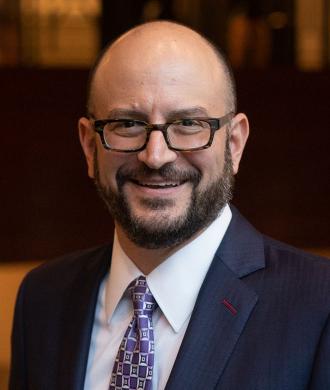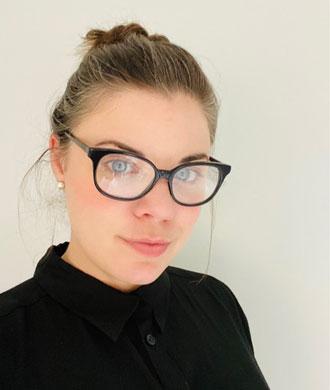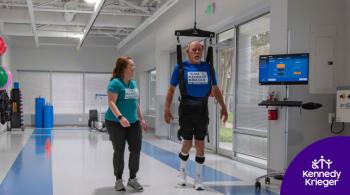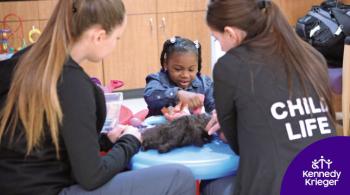Disability Services in College
Join Dr. Brad Schlaggar, president and CEO of Kennedy Krieger Institute and Dr. Lisa Carey, the assistant director of the Center for Innovation and Leadership in Special Education as well as an education specialist for the Neuropsychology Department at Kennedy Krieger. Accommodations for college require self-advocacy. It is the student themselves who must request those accommodations at the school—not the parents. Services such as occupational therapy, speech therapy, reading support, and instructional assistants, which may have been a part of a student’s IEP, are not a part of college accommodations.
Additionally, since many students live on a college campus, there may be additional accommodations to consider for housing, dining, and recreation. Listen as they dive into the process of requesting accommodations and the importance of working with the college’s Disability Support office. Families need to start preparing their child early for this change so that students have the self-advocacy skills to be successful in college.
Resources for students and families:
- Understood.org has great resources for understanding disability services in higher education
- Kennedy Krieger has a guide specifically for college students with a history of cancer.
- The US Department of Education Office for Civil Rights offers a guide of student rights and responsibilities in postsecondary education.
- Edutopia has a helpful blog post on this topic.
Learn More About Our Featured Speakers
Learn More About Our Featured Speakers
View Episode Transcription
Dr. Brad Schlaggar (BS): Welcome to Your Child's Brain, a podcast series produced by Kennedy Krieger Institute with assistance from WYPR. I'm Dr. Brad Schlaggar, pediatric neurologist, and president and CEO of Kennedy Krieger Institute. As your child prepares to head off to college, it's likely that both you and your child are experiencing a range of conflicting emotions, excitement, elation, trepidation, maybe some sadness. I can attest to all of these emotions because my son is heading to college later this month. Your child will be forging new experiences, facing new challenges, and continuing the transition from late adolescents to young adult, as exciting as this time can be for both you and your college-bound student, planning and preparing for college can also be overwhelming. For students who require accommodations for some form of disability and for their parents, this time can be even more anxiety-provoking. Research from the US Department of Education has found that only 37% of students with a disability reported that disability to their college. Additionally, Mental Health America, a nonprofit, dedicated to the promotion of mental health, surveyed 471 college students with mental health-related disabilities and found that 70% didn't register for accommodations from their school. Of these students, 41% reported not believing they were disabled enough, 33% reported that they did not know accommodations were available, and 26% reported fear of stigma for expressing their accommodation needs. These results are disconcerting, to say the least. Students aren't taking advantage of services that could help them reach their full potential in college and beyond. If you, your child, a loved one, or a friend is among the one and five college students that lives with a disability, this podcast episode is for you. We will help you understand your rights and how you or your child can ensure that the college will honor the right to accommodations. It's my pleasure to welcome my exceptional colleague from Kennedy Krieger Institute, Dr. Lisa Carey. Dr. Carey is the Assistant Director of the Center for Innovation and Leadership in Special Education, as well as an education specialist in the Department of Neuropsychology at Kennedy Krieger. Additionally, Dr. Carey serves as the school liaison for the Hospital Education Liaison Program Health, which currently serves patients seen in the Neuropsychology Oncology Follow-Up Clinic and the Sickle Cell Neurodevelopmental Clinic at Kennedy Krieger. Welcome Lisa. Let's dive in with some definitions. What do we mean by a disability, especially in the context of an educational setting such as college?
Dr. Lisa Carey (LC): When we're talking about college, we are usually talking about the definition of disability from the Americans Disability Act, the ADA as it's often referred to. This describes a disability as a person who has a physical or mental impairment that substantially limits one or more major life activity. Since attending school and learning are major life activities, that would mean that any kind of you can say, a learning disability or some type of neurodiversity or a mental health condition that impairs your ability to be able to participate in college classes or even living on campus, that those would qualify as disabilities.
BS: I mentioned the concept of accommodations. What are some examples of accommodations?
LC: Really frequently used accommodations in college would be extended time for assessments if you're taking a test. You would be able to take the test for longer than the class period, extended time for assignments. If you have a paper that's due, you might have a little bit more time to work on it. Being able to access a quiet or different area for test taking to reduce distractions. You could get assistance with note-taking or making audio recordings of classes or lectures.
BS: Now, families are likely quite familiar many families with the individualized education program or IEP process or a 504 plan in grades K through 12 prior to going to college. Can't that process just transfer over to college?
LC: The short and simple answer is no. The IEP is governed by a separate law that is focused on the K-12 area. Section 504 of the Rehabilitation Act actually does still matter for college, but we're not going to just roll over the 504 plan partially because it's a completely different arena. It's a different context, there's different needs and then also the student is usually going from having their parents making decisions to being the person that's supposed to be in charge. While those can't just roll over into college, keeping track of those documents and being able to use them for planning with the disability offices of whatever college or university you attend can be really important and can be a helpful starting place for having those conversations.
BS: Is there an equivalent process to the IEP process at colleges and universities?
LC: There is a process that is slightly different every single school you might attend. It's less planned out than you would have experienced with special education or with having a 504 plan in that once you're an accepted student, you would go to the disability office or whomever is in charge of that. That can vary widely based on how large your school is. For example, a larger university might have a whole office that has multiple staff members, whereas if you're attending a small college, there might be one faculty member that's in charge part time of checking on people's accommodations. From that point, you would then say, I wish to be identified as a student with a disability. They usually have some kind of intake process, and then you would have to show them documentation demonstrating your disability. You have to prove that you have a disability in some way. That's not usually a really time-consuming process. It's not like when you're getting an IEP or the special education process. It can be something often as simple as a letter from one of your doctors.
BS: You can imagine a situation where a student, the disability itself could make it difficult to request the accommodations, maybe a communication issue. Can a student ask for help to apply for those accommodations?
LC: The student needs to be in charge of the process, but they can recruit others to assist them. Just like a parent in an IEP meeting can have someone else come with them to the meetings or sit in on the phone calls, the student can do that as well. They can have a liaison, like myself, assist them. They could have a medical provider, a parent, a community member, someone that can help them advocate and communicate their needs, but all communication needs to flow through the student, and that just has to do with the fact that they're typically 18 or older, and so they're the ones that are in charge of communicating their educational needs.
BS: They have a right to a liaison or a helper in this case. What other rights do you students in a higher education setting have when it comes to requesting and receiving accommodation?
LC: There is a lot of variability in the way that process plays out, and some of that has to just do with how large or small a college or university is. For example, in undergrad, I attended St. Mary's College in Maryland, which had at the time 400 students in my freshman year class. There was a faculty member in charge of that. Whereas in graduate school and I attended Towson University, it's a very large university with thousands of students. There is a whole office dedicated to disability services. Some of this is just the context of the setting and how many students are being served. Things have evolved in the past few decades, so the Americans Disability Act wasn't passed until 1990, and so there's been a lot of change in the past few decades of figuring out how best to accommodate students. Basically, students have the right to request accommodations that are reasonable. When we say reasonable, what we're talking about is that those accommodations are there to help you have access to what the other students without disabilities have access to on campus, so that could be housing? It could be something in class? It could be your ability to learn in class. It has to be connected reasonably to your disability area. For example, if you have a learning disability, requesting specialized housing might be not a reasonable ask because you'd have to prove the link between your learning disability and the need for specialized housing.
BS: What are some of the barriers that students experience to requesting accommodations, and how have you seen students overcoming those barriers? Maybe share a vignette or two about such scenarios.
LC: One of the biggest barriers is students not being prepared to advocate for their own needs. It's a big difference between having your parents or guardians communicating with the school on your behalf in high school and making a plan and you are expected to come to those meetings, but maybe you're not staying the whole time and maybe you're not the person who's running the show. Then when you get to college, you have to be the one advocating for yourself. There's also a change in that when you're in high school, the other teachers are coming with suggestions of what might help you. When you get to college, you're expected to come with that list of accommodations. You're expected to say, these are the things that I need, and no one's going to prompt you with lists or say, students, like we know you so well, so this is the things you need because you're usually a new student. That ability to advocate for yourself can be really difficult. For example, in the work I do with our Oncology Follow-Up Clinic, we wound up working with college age students to say, what are the places you got hung up and created a step by step guide for this is what you have to do and these are the things you should have prepared before you even talk to the disability office and here's the letter you might need to ask for from your doctor. That was something that was created with patients who are also college students and then they've been using it and saying that it's been helpful. The next one is that sometimes students don't know that they could qualify. They don't realize that they could be asking for things. I can use myself as an example. I have had chronic migraines since I was in high school. I didn't realize that I could be asking for things like housing accommodations until my junior year of college. I was at some point able to then say, I need a quieter place, I need to be able to turn the lights off and not have music playing or need to not have roommates so that I can control my environment when I'm having a migraine. Then once I figured out that I was eligible for that, I was able to advocate for myself and had a very different experience my senior year of college. Then the third reason that we see a lot of is that students are worried that if they disclose their disability in college, that they will be judged negatively, that people might not find them to be capable and that they withhold that information. But I have seen a lot of students who then they get to a point where they're almost in crisis mode and they finally say, like, okay, I'm going to ask for accommodations because it's either this or just not do well. They're usually so relieved when they finally start getting what they need. I would say to you any students entering college, you go to the disability office and if you do feel like someone is judging, you talk to the disability office because they can assist you with that.
BS: Lisa, can you share how it was maybe the beginning of junior year that you came to understand that these accommodations were available?
LC: Yes. I had someone I was remarking about how nice it would be to have one of the single rooms that were on campus and there weren't that many of them. I was like, that would be so amazing and someone said, well, did you know that because you have migraines, you could just request to have one of those. It was just another student telling me, like, yeah, you just got like a medical accommodation. You have a legitimate thing. It was just shocking, and then I went and asked, what do I need? They're like, you need a brief letter from your doctor. I was able to really quickly get what I needed, and then it was just thoughts of how I'd spent two years of just being like, can I please have the lights off? Or just begging people to not be loud next door. It was very different. I felt relieved to have control back that I needed to take care of my health over the environment. I just had no idea that that was possible.
BS: You mentioned that it might be something as simple as a letter from a doctor describing the condition. What other documentation might a student need or be asked to provide to support the request?
LC: Typically, you're asked to support the documented disability with someone who is a professional in the area that's linked to your disability. For example, for students that we work with who have sickle cell disease, that's usually getting a letter from one of the specialists treating sickle cell disease, so usually from a hematologist or a neurologist that specializes in working with patients with sickle cell disease. If it's a mental health disorder then the person who's treating your mental health disorder, so your therapist, your psychologist, psychiatrist, that's usually the person who you would want to seek documentation from. If you have a learning disability, it really depends on what the school is going to require. Sometimes schools will take your old IEP or 504 plan and has it documented that you had dyslexia or another reading or math disability and use that and other schools might request something a little bit more robust like having had cognitive testing recently from a psychologist or neuropsychologist.
BS: After accommodations are provided, who at the school knows about it. For example, do the faculty members know? They may know that you are receiving the accommodation, but are they privy to why?
LC: It is up to the student to disclose their disability. All that the Office of Disability Services and those offices all have different names at different schools. But they will provide students with here's your approval letter and here's what you are eligible for in terms of accommodations. In most cases, it's up to the student to provide that information to their professors. Some schools now that schools have such robust learning management systems and student portals are sending that information out for students, which some students have said it is helpful. Others have said that the professors get so many of those that it's still helpful to follow up with an email with the letter explaining the accommodations. None of that documentation says what your disability is. It is up to the student to decide if, when and to whom they wish to disclose their specific disability, and you could decide to share that with some professors and not with others. For example, a student might be taking an intro to literature class and need accommodations in that class and so disclose to that professor and share the list and have a conversation with them about their needs. Whereas they might be taking a PE credit and not need those accommodations and not need to have that conversation.
BS: We've talked a bit about the concept of reasonable accommodations. What steps can be taken if a student believes that they've been denied access to reasonable accommodations?
LC: There's two ways that a student might be denied access. The first is that they've been approved as a student with a disability to have accommodations and there is an individual professor who is refusing their accommodations. Sometimes faculty are not as well trained and don't realize that it's not up to them whether or not someone gets an accommodation. In that case, it's usually a matter of the student going to the disability office and sharing what's been going on and having that office take care of it, because at that point, it's really a human resources issue and a training issue of the faculty and not something that the student should be having to fight about. The other issue could be that the student presents information of having a disability, and the school says that they do not recognize them as a student with a disability. In which case, all schools have to have some type of grievance process in which you can say, I disagree with their decision. It's just a matter of finding out how to initiate that grievance process at the school you're attending, and that is going to, again, vary widely depending on the size of the college or university.
BS: Can you imagine a situation where a student has the insight that they believe they have a learning disorder, but it hasn't been diagnosed yet, and there they are, starting out college, university. What do you recommend in that situation?
LC: It would depend on how things are going for that student in terms of what the next and what the concern was. But under the law, this university or college does not have an obligation to provide accommodations unless there's a documented disability. In that case, the student might want to go through the process of having that disability documented. If they're in college and feeling like they need those accommodations, they might want to have that documentation for after college too in their career because they can request accommodations in their workplace as well. For example, if you believe that you have a learning disability, you might want to go to a psychologist or neuropsychologist who specializes in diagnosing learning disabilities. Sometimes the campus itself might have resources. For example, most campuses have mental health service providers on campus. If you believe that you're someone who has a mental health condition and you want a diagnosis, you might be able to go that route.
BS: We've talked about this scenario where students are already accepted to a school about to matriculate or have matriculated but what about getting in front of it with thinking about prior to even the application process, maybe at the search level, identifying schools that are perhaps more accommodating in general? Are there ways to learn about such schools that tend to have more robust access to accommodations? What do you guide students who are thinking about going to college and want to know what might be the best list of schools to consider?
LC: The first thing I usually do is go through the college process as I would with any student, saying, what are you interested in studying? Also, do you want a large school or a small school? If you look online just to see disability services, you'll pretty much relegate yourself to larger colleges and universities because they're the ones that are going to have a web page for their office while as a smaller school might not have that in their web presence as visible or part of a simple Google search would find. Once you've identified what schools you're interested, where do you want to be in state, out of state? I think the next thing is to start connecting with that school and just asking that question directly to the admissions office. Then also asking if you can speak with students who would be willing to discuss their experiences with you as a student with disability. When I was an undergrad, I actually was in charge of our hiring and training our tour guides, and so I was actually the person fielding a lot of those questions in the admissions office, where I would connect other students, students who were willing to self disclose about their disability status and share their experiences, what was good, what was not great, and what they wish they had done differently. That's a really big piece because it's not just the list of accommodations, it's also the campus culture that can really change how a student with a disability experiences their first four years of post secondary education.
BS: What happens when a student, despite receiving reasonable accommodations is still struggling, and the struggle is largely a consequence of the disability that they're managing. What do you recommend there? What steps should be taken?
LC: When we talk about disability services, we often put the focus on the accommodations, but there's so much more to doing well in college than receiving accommodations. I think sitting down and really working with either a faculty advisor or someone else at the school or even a parent or another a fellow student, and just going through the list of resources that you have available to you, and figuring out how to support yourself. For example, many schools have writing centers. If it's writing assignments that you're struggling with, making a weekly appointment at the writing center to work on every piece of writing that you're doing can be really helpful. There's usually peer tutoring available for free through different services. The library often offers supports as well with conducting research and understanding search practices and getting your assignments completed. Just going through and figuring out what are the resources I have available to me? Then usually not just having a list of those resources, but having an actionable plan to make use of them. How often are you going to go to the writing center? When are you going to do that? Are you going to do it just the night before your papers do? That's not a good idea. Just going through, these are the things I'm going to do. I'm going to get myself set up with a peer tutor at the beginning of the year. I'm having trouble with time management, so I'm going to purposefully seek out someone that can help me with my time management skills. The idea would be to find all the different services and resources that your college or university offers and wrapping those around yourself in a purposeful and planned out way, much like the way it was done with an IEP or a 504 plan in high school. Only now you're figuring this out and what you're going to make use of. What's nice about those resources on campus is that they have nothing to do with your disability status. Anyone is able to access those resources. You don't need any special permission. If you are a student who suspects they have a disability, but you don't have the documentation to get accommodations like extended time, you can still make use of all of those resources and really have a robust plan for how you're going to get academic support throughout your college career.
BS: You mentioned earlier, the Americans with Disabilities Act passed over 30 years ago now, and you just were referencing how just in general, resources are increasingly available in many, perhaps not all, but many higher education settings. How would you describe how things have evolved laws, and more equitable culture on campuses over these last, say, 10, 20 years to becoming increasingly available for students with and without disabilities.
LC: Someone who's coming up on their 20 year anniversary from underground. I can say that in the past 20 years, just hearing people discuss disability openly has really changed. Having people share diagnoses, share just conversations about neurodiversity that are happening on social media. Are so much more robust and open, and I feel much more welcoming, that I think that fear of judgment, we can start to say, even if I do have a bad experience, I know there's a lot of people out there that are going to support me and help me work through this. I think also with technology, having a smartphone carry around, it has so many different accessibility features on it that we're all turning on and off all the time regardless of our disability status. It's just that presence of how much assistive and accessible technology is available is also really helpful for students. In the past, if you were a student with low vision, you might have to have really large contraptions brought with you to college to be able to access text, and now you can download an audio book on your phone. It's just very different in terms of the access that we have and the way that we can even just accommodate ourselves. One thing I always encourage high school and college and young adults to do is really to start to figure out what works for you, what access do you need and how much of that is just readily available in the environment? Then what do we need to layer on to further support you?
BS: Let's close with talking about some good resources that you think are out there for students and families who are navigating say this process or all these processes of finding schools that are most available for accommodations, understanding how to engage with the school, what happens if things don't go the way they should, etc. What are some good resources?
LC: Understood.org has really great resources about understanding disability services and higher education and really goes step by step. How is it different from what you experienced in high school? That's just really accessible language for teenagers and their parents. Then the US Department of Education Office of Civil Rights has a guide about student rights and responsibilities in post secondary education that really breaks down your legal rights, but then also what you need to be doing as the student in college. There is a really helpful blog post by Edutopia about this topic and it's actually geared more toward high school teachers and how can you prepare students for being ready to self advocate in college and I think that's a really great resource for parents as well. Then finally, that guide that I mentioned earlier, we created for college students with a history of cancer, so it's a cancer specific guide. I'm hoping that we'll be able to make other more specific guides for different disability areas in the future just because there are certain things that come up depending on what your disability is, certain specific questions or places that you might want to get documentation from, and having that really specific guide can be helpful.
BS: We'll take all of the suggestions for resources. Put them up on the web page associated with this episode to make them available to our listeners going forward. I think that's an excellent place to end. Thank you to our guest, Dr. Lisa Carey. We hope that you our listeners have found this discussion about requesting accommodations for college students with disabilities interesting and informative. Please check out our entire library of topics on Your Child's Brain at WYPR.org, KennedyKrieger.org/YCB, or wherever you get your podcasts. You've been listening to Your Child's Brain. Your Child's Brain is produced by Kennedy Krieger Institute with assistance from WIPR and producer Spencer Bryant. Please join us next time as we examine the mysteries of Your Child's Brain.

















